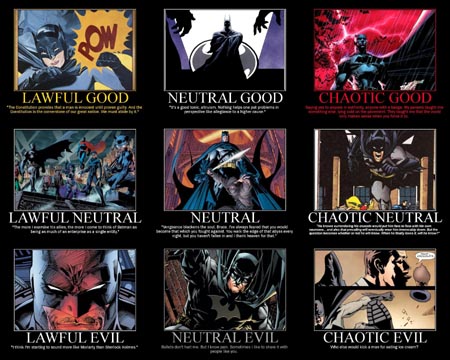That sounds like the dilemma laid out in the pre-story to the Icewind Dale game:Amnestic said:This is true, but a Paladin isn't going to be suicidal and he does his deity no favours by blindly sacrificing himself on the claws of a Red Dragon he has no business trying to fight because he's level 3 and it's got a claw three times the size of his entire body. Sacrifice, yes, but needless sacrifice is pointless and a Paladin should know the difference.permacrete said:To properly role-play a Paladin requires cooperation and trust between the player and the DM. The essence of the traditional Paladin is sacrifice. With the exception of the tools of the Paladin's trade (sword, shield, armor, warhorse) he or she should be willing to give up everything else in the service of the deity. The player needs to be able to count on the DM providing opportunities to provide for a character's needs in a way that keeps the game fun.Ernil Menegil said:In the end, Alignment is a complex system which most people, I've found, will defecate on. I personally love it, but when I look at the paladin tropes instituted ("Shoot first, ascertain innocence later"), I notice that a truly well-roleplayed paladin is rarer than dodos.
Everard the local cleric of Tempus is a grizzled sort, whose temple is built over the 'Stone of Jerrod'. Jerrod being a shaman of the Uthgart, who in an heroic sacrifice, dies attempting to close a big ole' demon portal. Anyway, point of contention on Everad's part is that Jerrod's sacrifice was utterly worthless. Jerrod, having seen what he took to be an omen from his god, Tempus took that as a sign that he should plunge into the portal. (Thus sealing it.)
Everard's thinking though, was that the omen was a sign that the battle was turning in the barbarian's favour and -not- that Jerrod should sacrifice himself. That in doing so, Jerrod dishonoured himself by not continuing the fight, either falling in batter or emerging victorious. Course, Everard's views in the matter come into play in the endgame, however it's an interesting dilemma.
If your alignment dictates you follow a certain course, does that make it illogical to follow another when such presents itself? Even if such would normally be against that alignment. If I'm a primarily Lawful Evil overlord, does it not make sense if I were captured by the forces of good to somehow placate them and not, you know, antagonise them? (Though, thinking on it, why would a Lawful Evil personage be in such a position, since ideally they'd conduct themselves in such a way as not to invite such retaliation or at least, as long as it were deemed necessary to do so.)
Bah, I'm waffling. Good article though.

